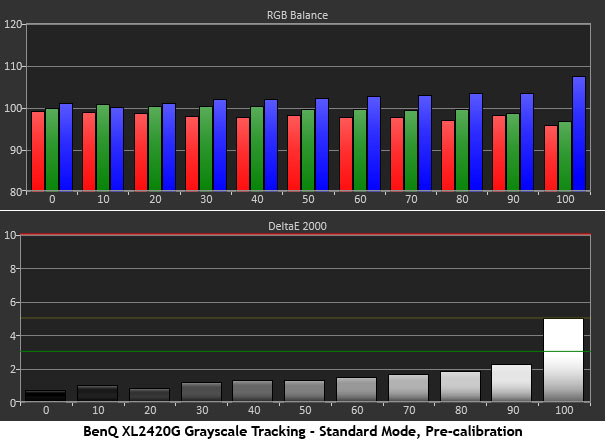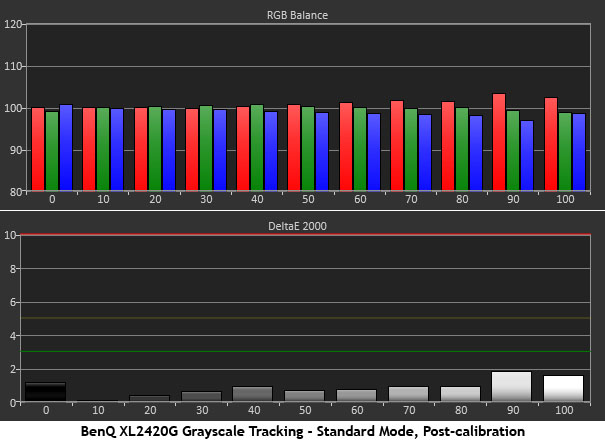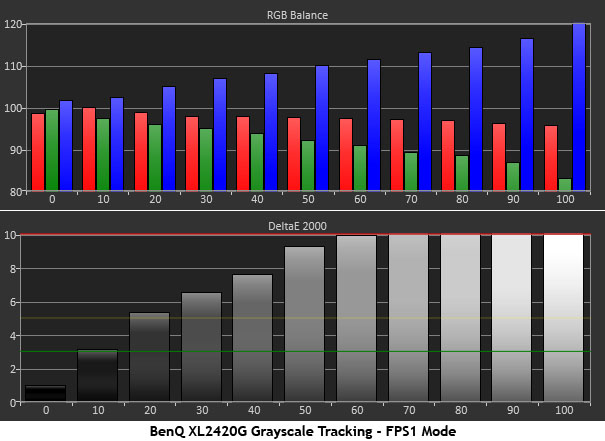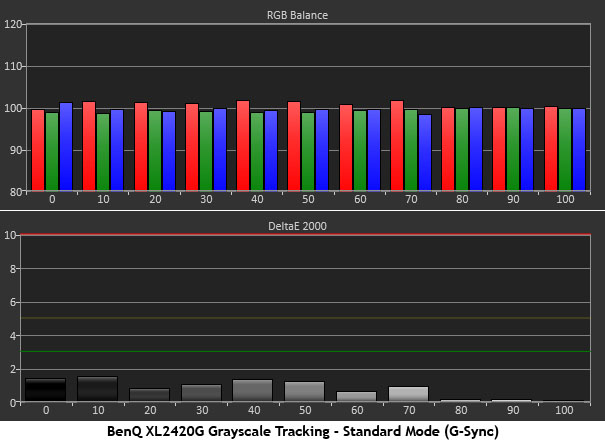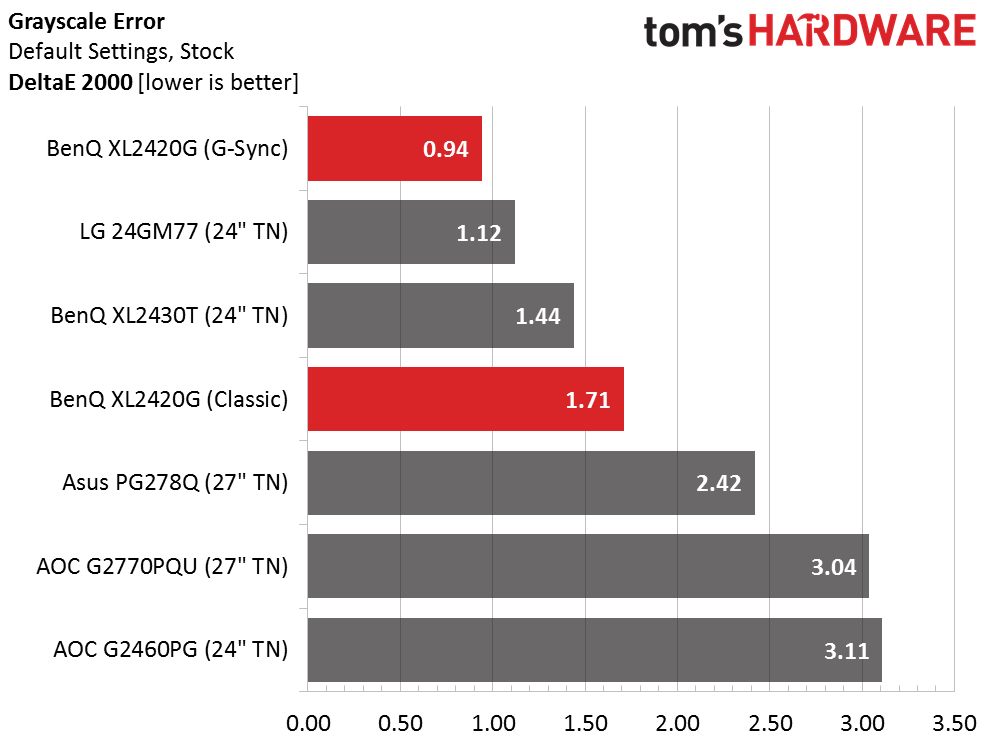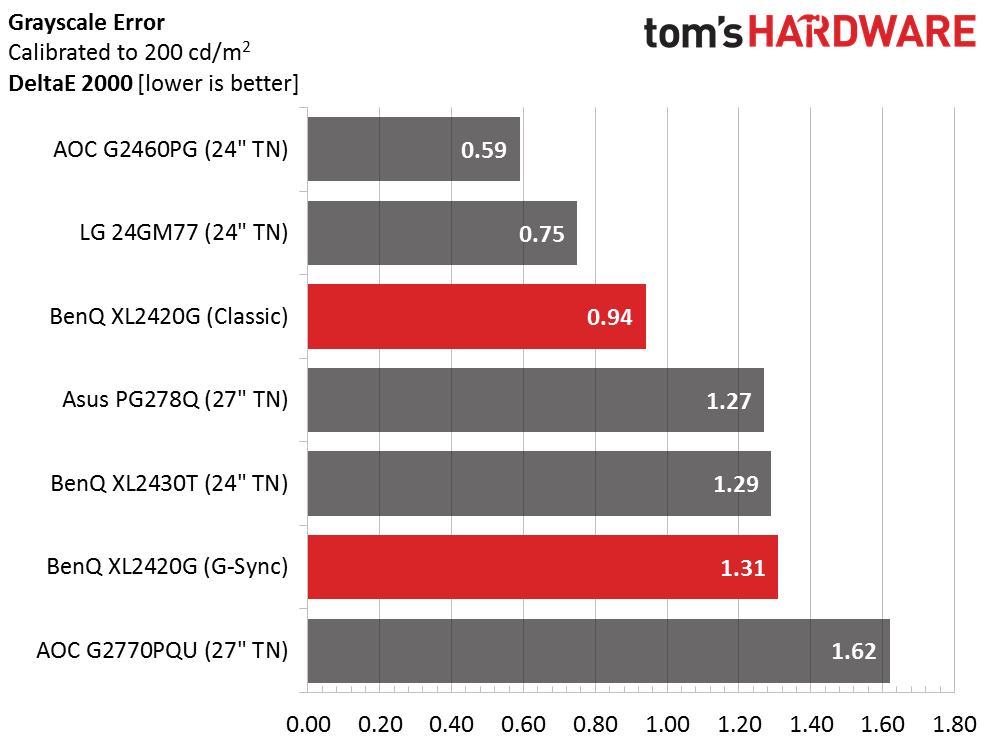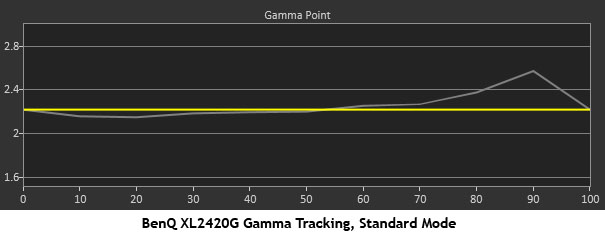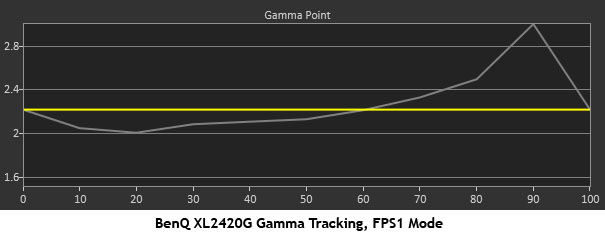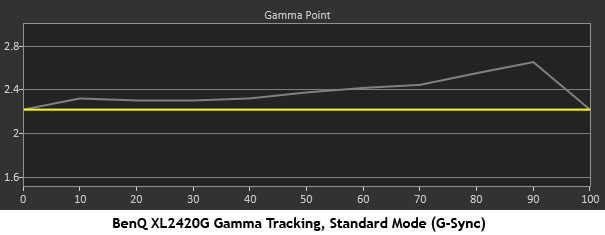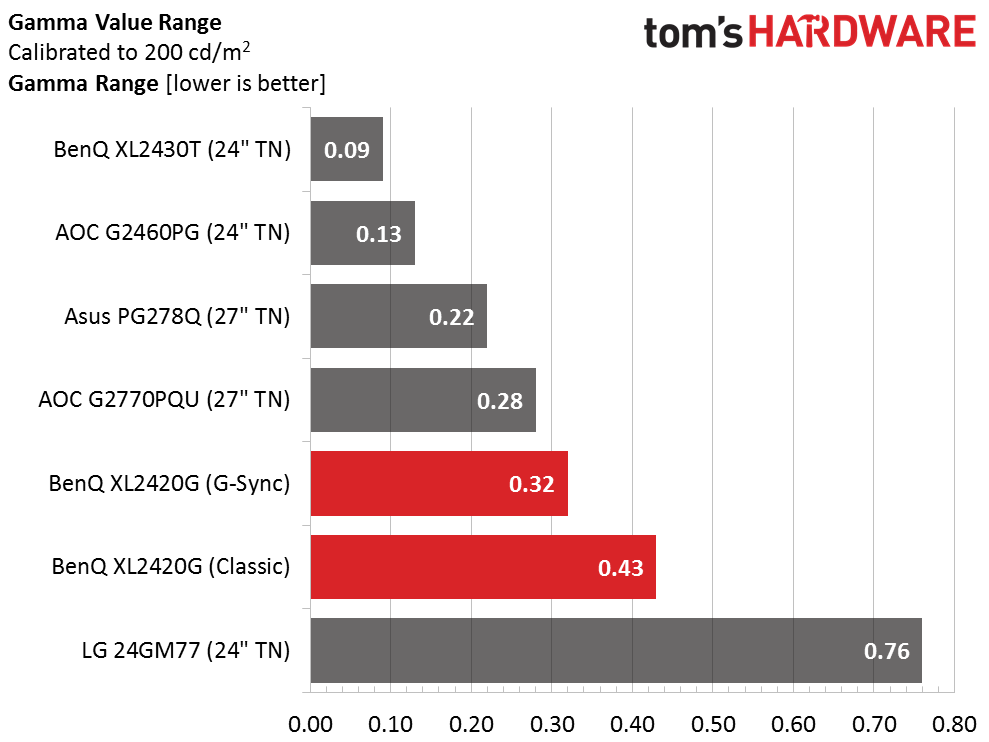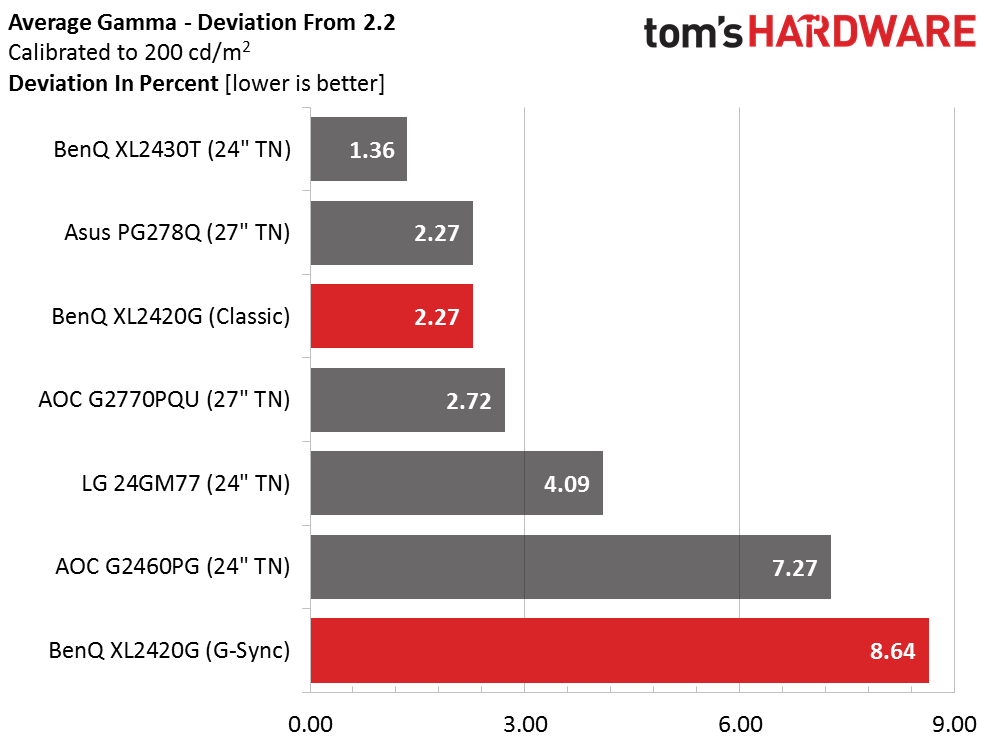BenQ XL2420G G-Sync Monitor Review
Even though FreeSync is starting to appear, G-Sync is still the go-to tech for gamers seeking an image free of frame-tearing. Today we’re checking out BenQ’s latest feature-laden display – the 24-inch XL2420G.
Why you can trust Tom's Hardware
Grayscale Tracking And Gamma Response
Our grayscale and gamma tests are described in detail here.
Once again we’re comparing Classic and G-Sync modes in the grayscale tests. We’ll also show you the results from the FPS1 picture mode.
In Classic mode, the Standard picture preset comes close to the mark except for 100-percent brightness. That level has a noticeable blue tint. Fortunately, it can be fixed with a few tweaks to the RGB sliders.
Calibration produces an excellent result with just a touch of red in the 90- and 100-percent levels. The error is comfortably below the threshold of visibility however.
FPS1 is one of the dedicated gaming modes. Grayscale tracking is so skewed towards blue that the error goes off our chart at 60 percent and above. In some content, the picture may appear brighter, but color detail definitely suffers for it.
In G-Sync mode, you don’t even need to calibrate for near-perfect grayscale tracking. Just choose the Normal color temp preset. In fact, we tried to improve upon the above chart and were unsuccessful.
Here is our comparison group:
Get Tom's Hardware's best news and in-depth reviews, straight to your inbox.
Classic mode measures well out of the box, and G-Sync mode is even better. Our Classic mode results can be improved ever-so-slightly with calibration. But in G-Sync, it’s best to simply select the Normal color temp and be done with it.
Calibrating Classic mode yields the exact same average DeltaE error as G-Sync mode right out of the box. That’s pretty impressive in our opinion. Really though, you don’t need to calibrate either mode for a great image on the XL2420G.
Gamma Response
Gamma doesn’t change much when you calibrate, so we’re showing you the post-adjustment result. It’s pretty solid except for a spike at 90 percent that represents an error of 6.5cd/m2 below the target. At such a high brightness level, you won’t see the problem outright. But it does spoil an otherwise excellent chart.
In the FPS1 gaming mode, tracking is skewed too light at the low end and too dark at the high. Actual content reflects slightly washed-out shadows and highlights that have a little less pop. In effect, the brighter areas of the image have less contrast than they should.
In G-Sync mode, we recommend changing the gamma preset from three to one. It won’t make a difference in Classic mode since the two configurations operate independently.
This gamma result helps explain why we measured lower contrast in G-Sync mode. As the signal level rises, actual output levels don't rise fast enough. The result is a slightly more drab image than the XL2420G is capable of.
Here is our comparison group again:
Classic mode scores lower in this test because of the spike at 90-percent brightness. If it tracked better, the XL2420G would be at or near the top of our comparison group. We know BenQ can do gamma properly given the result posted by its XL2430T. Perhaps a firmware update could fix the errors we encountered.
With a smaller deviation of .32, G-Sync mode tracks a little flatter.
We calculate gamma deviation by expressing the difference from 2.2 as a percentage.
We prefer the gamma in Classic mode given its closer adherence to the 2.2 standard. Remember that we changed the preset from three to one when switching to G-Sync mode. This is the only real weakness in the XL2420G’s video performance.
Current page: Grayscale Tracking And Gamma Response
Prev Page Brightness And Contrast Next Page Color Gamut And Performance
Christian Eberle is a Contributing Editor for Tom's Hardware US. He's a veteran reviewer of A/V equipment, specializing in monitors. Christian began his obsession with tech when he built his first PC in 1991, a 286 running DOS 3.0 at a blazing 12MHz. In 2006, he undertook training from the Imaging Science Foundation in video calibration and testing and thus started a passion for precise imaging that persists to this day. He is also a professional musician with a degree from the New England Conservatory as a classical bassoonist which he used to good effect as a performer with the West Point Army Band from 1987 to 2013. He enjoys watching movies and listening to high-end audio in his custom-built home theater and can be seen riding trails near his home on a race-ready ICE VTX recumbent trike. Christian enjoys the endless summer in Florida where he lives with his wife and Chihuahua and plays with orchestras around the state.
-
Wisecracker I can understand why the display folks thread lightly, here. This price point is a minefield and miss-mash of tech. This monitor might be a bargain at $300.Reply
Otherwise, $500-$600 is Eyefinity/Surround, HD Projector, 60-inch Plasma TV territory. It's a tough sell for a display port-capable monitor these days in Adaptive/G -Sync, being that we are only moments before the flood.
And, the market is not in the high-end, at least, not for long. It's back where us poor slubs with 'pitiful' $200 gaming cards :lol: need the help.
-
bogda Finally a G-Sync monitor with more inputs than one DP. Now give me 1440p resolution and price below 500 and I will consider it.Reply -
DarkSable Just throwing out there - saying that the brighter the monitor the better is absolutely far from the truth. If you're in an office environment under florescent lighting, then sure, but if you're interested in a gaming computer, it's probably in your room or a den, and, well... brighter is only better if you only game at night, or have every possible light on while you do.Reply
From all the gripes about how the monitor gets so dim, that's actually a HUGE benefit for me - nobody every bothers to test what the minimum brightness a monitor can achieve, and many monitors, especially gaming monitors, fail miserably. I'd much rather have less eye strain than picture-perfect colors when I'm gaming at night. -
PaulBags DP has better bandwidth, so why does the HDMI here have better contrast and colour accuraccy?Reply -
Shankovich Here's that $200 nVidia premium kicking in. Could have made it IPS or 1440p guys come on...Reply -
blakphoenix I'm sorry but there is no way this monitor could be classed as having "professional-level color accuracy". For starters it doesn't even get 100% sRGB, let alone the terrible sub 70% AdobeRGB performance. Is it good enough for games? It may well be. Is it professional level colour? Not even close!Reply -
bystander ReplyJust throwing out there - saying that the brighter the monitor the better is absolutely far from the truth. If you're in an office environment under florescent lighting, then sure, but if you're interested in a gaming computer, it's probably in your room or a den, and, well... brighter is only better if you only game at night, or have every possible light on while you do.
Brightness does have one important use; ULMB. In ULMB, because the backlighting pulses, it causes these monitors to be very dim. Extra brightness helps to counteract this issue, but I do agree, testing the minimum might be useful, as there are some people out there that have to play at nearly the lowest levels due to headaches.
From all the gripes about how the monitor gets so dim, that's actually a HUGE benefit for me - nobody every bothers to test what the minimum brightness a monitor can achieve, and many monitors, especially gaming monitors, fail miserably. I'd much rather have less eye strain than picture-perfect colors when I'm gaming at night. -
TechyInAZ Wow very sweet for a monitor. I would highly consider this monitor if I can afford it. Since I use my computer for both work and play.Reply
However, for that price I'm disappointed it's only 1080P. I hope they come out with a free sync 1440P version that's cheaper than this monitor.
